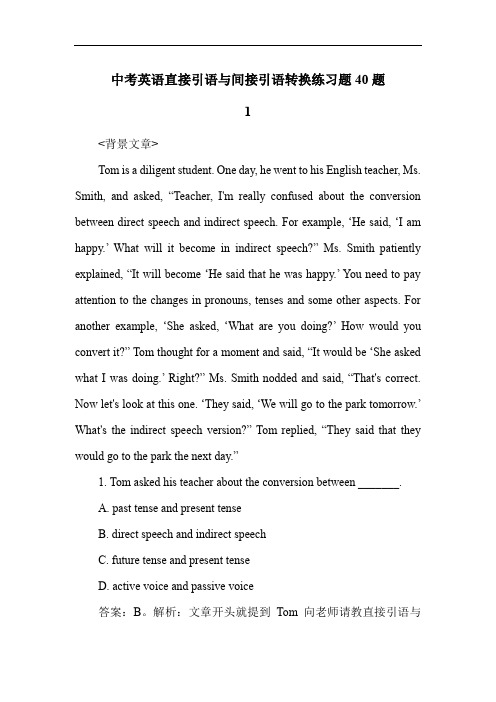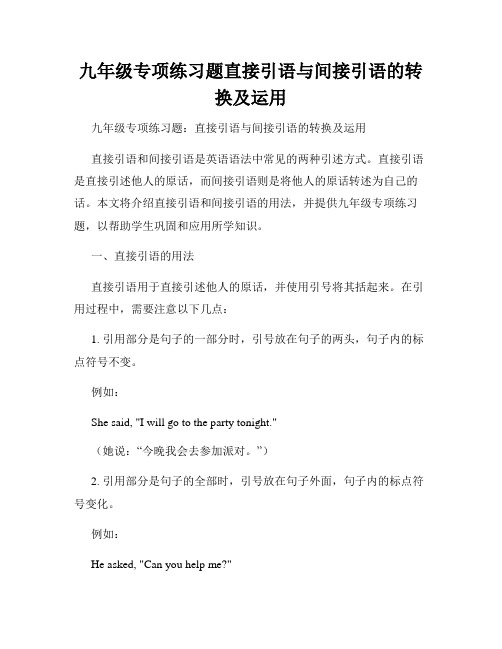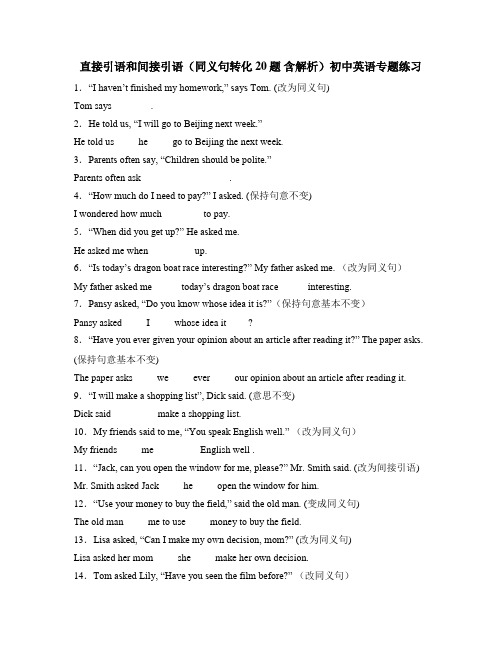2010年中考英语直接引语专项指导练习9
中考英语直接引语练习题

中考英语直接引语练习题在中考英语中,直接引语的运用是考查学生语言运用能力的一个重要方面。
直接引语是将别人的话原封不动地引用到自己的语言中,通常用引号标出。
以下是一些中考英语直接引语的练习题,供学生练习使用。
练习题一:根据对话内容,将下列句子转换为直接引语。
1. 李明告诉他的朋友,他明天会去图书馆。
- 李明说:“_________。
”2. 老师问我们是否完成了作业。
- 老师说:“_________。
”3. 妈妈告诉我,她要晚些时候回家。
- 妈妈说:“_________。
”答案:1. 李明说:“I will go to the library tomorrow.”2. 老师说:“Have you finished your homework?”3. 妈妈说:“I will be home later.”练习题二:阅读下面的对话,然后回答问题。
- 李华:你打算周末做什么?- 张强:我打算去看电影。
1. 李华问张强什么?- 李华问:“_________。
”2. 张强的计划是什么?- 张强说:“_________。
”答案:1. 李华问:“你打算周末做什么?”2. 张强说:“我打算去看电影。
”练习题三:根据所给的直接引语,回答问题。
1. "I have finished my homework," said Tom.- 汤姆完成了他的作业吗?- 回答:_________2. "I will go to the park with my family," said Lucy. - 露西打算和谁一起去公园?- 回答:_________答案:1. 回答:是的,汤姆完成了他的作业。
2. 回答:露西打算和家人一起去公园。
练习题四:将下列句子改写为间接引语。
1. "I am going to the store," said Mary.- 玛丽说她要去商店。
2. "We have a new teacher," the students said.- 学生们说他们有一个新的老师。
中考英语直接引语与间接引语转换练习题40题

中考英语直接引语与间接引语转换练习题40题1<背景文章>Tom is a diligent student. One day, he went to his English teacher, Ms. Smith, and asked, “Teacher, I'm really confused about the conversion between direct speech and indirect speech. For example, ‘He said, ‘I am happy.’ What will it become in indirect speech?” Ms. Smith patiently explained, “It will become ‘He said that he was happy.’ You need to pay attention to the changes in pronouns, tenses and some other aspects. For another example, ‘She asked, ‘What are you doing?’ How would you convert it?” Tom thought for a moment and said, “It would be ‘She asked what I was doing.’ Right?” Ms. Smith nodded and said, “That's correct. Now let's look at this one. ‘They said, ‘We will go to the park tomorrow.’ What's the indirect speech version?” Tom replied, “They said that they would go to the park the next day.”1. Tom asked his teacher about the conversion between _______.A. past tense and present tenseB. direct speech and indirect speechC. future tense and present tenseD. active voice and passive voice答案:B。
九年级专项练习直接和间接引语

九年级专项练习直接和间接引语九年级专项练习:直接和间接引语引言在学习英语的过程中,掌握直接和间接引语是非常重要的一部分,因为它们帮助我们有效地传达他人的言辞和观点。
直接引语直接引用他人的原话,而间接引语则以自己的话语转述他人的言辞。
在本文中,我们将深入研究直接和间接引语的概念,探讨它们的用法和规则,并提供一些九年级专项练习,以帮助学生更好地掌握这一重要的语法概念。
一、直接引语1. 定义:直接引语是指将别人的原话以引号括起来直接引用在自己的句子中。
这种引语通常用于报刊、采访和引用他人观点的情况。
2. 样例:直接引语:小明说:“我喜欢学习英语。
”直接引语:老师宣布:“明天将进行一次重要的考试。
”3. 用法:在使用直接引语时,需要注意以下几点:- 引号括起来:原话必须放在引号内,以示区别。
- 动词变化:通常,直接引语中的动词时态和人称保持不变。
- 标点:引用句子末尾使用逗号、句号或分号。
二、间接引语1. 定义:间接引语是指以自己的话语来转述他人的原话或观点,通常不使用引号。
2. 样例:间接引语:小明说他喜欢学习英语。
间接引语:老师宣布明天将进行一次重要的考试。
3. 用法:使用间接引语时,需要遵循以下规则:- 动词变化:动词时态和人称通常要根据引述者的主观态度或原话时态而变化。
- 没有引号:与直接引语不同,间接引语不使用引号。
三、九年级专项练习为了帮助九年级学生更好地理解和掌握直接和间接引语,以下是一些专项练习,分为两个部分:**练习1:直接引语**1. 把以下句子改写成直接引语形式:- 小王告诉我,他明天不会来上学。
- 妈妈问我是否我完成了作业。
- 阿姨宣布明天将有一场重要的会议。
**练习2:间接引语**1. 把以下句子改写成间接引语形式:- 他说:“我会帮你的。
”- 她宣布:“我们下周去度假。
”- 老师告诉他:“你的考试成绩非常出色。
”总结在英语学习中,直接和间接引语是非常重要的语法概念,可以帮助我们更准确地传达他人的观点和言辞。
九年级专项练习题直接引语与间接引语的转换及运用

九年级专项练习题直接引语与间接引语的转换及运用九年级专项练习题:直接引语与间接引语的转换及运用直接引语和间接引语是英语语法中常见的两种引述方式。
直接引语是直接引述他人的原话,而间接引语则是将他人的原话转述为自己的话。
本文将介绍直接引语和间接引语的用法,并提供九年级专项练习题,以帮助学生巩固和应用所学知识。
一、直接引语的用法直接引语用于直接引述他人的原话,并使用引号将其括起来。
在引用过程中,需要注意以下几点:1. 引用部分是句子的一部分时,引号放在句子的两头,句子内的标点符号不变。
例如:She said, "I will go to the party tonight."(她说:“今晚我会去参加派对。
”)2. 引用部分是句子的全部时,引号放在句子外面,句子内的标点符号变化。
例如:He asked, "Can you help me?"(他问:“你能帮助我吗?”)3. 引用中出现的人称、时态、例外词等要保持一致。
例如:She said, "I like this book."(她说:“我喜欢这本书。
”)二、间接引语的用法间接引语是将直接引语转述为自己的话。
在使用间接引语时,需要注意以下几点:1. 引导词:常用的引导词有say, tell, ask等,根据具体语境选择合适的引导词。
例如:She said that she liked that book.(她说她喜欢那本书。
)2. 动词变化:时态、人称等要保持一致,标点符号不变。
例如:He asked if I could help him.(他问我是否能帮助他。
)3. 地点和时间的变化:根据具体情况进行调整。
例如:She said, "I will go to the party tonight." → She said that she would goto the party that night.(她说:“今晚我会去参加派对。
中考英语直接引语练习题

中考英语直接引语练习题一、将下列句子改为直接引语1. 李红说她会尽快完成作业。
2. 老师告诉我们明天要带英语书。
3. 王明说他昨天去了图书馆。
4. 妈妈提醒我不要忘记关灯。
5. 张华说他最喜欢的颜色是蓝色。
二、将下列直接引语改为间接引语1. "我明天要去北京出差。
" 李老师说。
2. "你们应该珍惜时间,努力学习。
" 校长对同学们说。
3. "我会帮你解决这个问题。
" 同桌对小华说。
4. "这本书很有趣,你们可以看看。
" 老师推荐给我们。
5. "我希望你能够参加这次活动。
" 班长对小丽说。
三、根据情境,将下列句子改为直接引语1. 情境:小明向朋友介绍他的爱好。
句子:小明说他喜欢打篮球和游泳。
2. 情境:小红在电话里告诉妈妈她晚些回家。
句子:小红说她今天会晚些回家。
3. 情境:老师询问学生为什么迟到。
句子:学生说他因为堵车所以迟到了。
4. 情境:班长通知大家明天举行班会。
句子:班长说明天我们要举行班会。
5. 情境:妈妈告诫孩子要注意安全。
句子:妈妈说上学路上要注意安全。
四、根据对话内容,将直接引语改为间接引语1. A:昨天晚上我看了那部电影,真的很感人。
B:_______2. A:你能帮我借一本书吗?B:当然可以,请问你要借哪本书?3. A:你们班这次考试平均分是多少?B:_______4. A:明天我们一起去公园吧。
B:_______5. A:你为什么没来上课?B:_______中考英语直接引语练习题一、将下列句子改为直接引语1. 李红说她会尽快完成作业。
2. 老师告诉我们明天要带英语书。
3. 王明说他昨天去了图书馆。
4. 妈妈提醒我不要忘记关灯。
5. 张华说他最喜欢的颜色是蓝色。
二、将下列直接引语改为间接引语1. "我明天要去北京出差。
" 李老师说。
2. "你们应该珍惜时间。
直接引语和间接引语(同义句转化 20题 含解析)初中英语专题练习

直接引语和间接引语(同义句转化 20题含解析)初中英语专题练习1.“I haven’t finished my homework,” says Tom. (改为同义句)Tom says .2.He told us, “I will go to Beijing next week.”He told us he go to Beijing the next week.3.Parents often say, “Children should be polite.”Parents often ask .4.“How much do I need to pay?” I asked. (保持句意不变)I wondered how much to pay.5.“When did you get up?” He asked me.He asked me when up.6.“Is today’s dragon boat race interesting?” My father asked me. (改为同义句)My father asked me today’s dragon boat race interesting.7.Pansy asked, “Do you know whose idea it is?”(保持句意基本不变)Pansy asked I whose idea it ?8.“Have you ever given your opinion about an article after reading it?” The paper asks. (保持句意基本不变)The paper asks we ever our opinion about an article after reading it. 9.“I will make a shopping list”, Dick said. (意思不变)Dick said make a shopping list.10.My friends said to me, “You speak English well.” (改为同义句)My friends me English well .11.“Jack, can you open the window for me, please?” Mr. Smith said. (改为间接引语) Mr. Smith asked Jack he open the window for him.12.“Use your money to buy the field,” said the old man. (变成同义句)The old man me to use money to buy the field.13.Lisa asked, “Can I make my own decision, mom?” (改为同义句)Lisa asked her mom she make her own decision.14.Tom asked Lily, “Have you seen the film before?” (改同义句)Tom asked Lily she seen the film before.15.He asked Lily if she liked Chinese Kongfu.(改同义句)He asked Lily, “ you Chinese Kungfu ?”16.He said to me, “I’m reading newspaper now.”He me that reading newspaper .17.He said, “I will see my friends tomorrow.”He said that see friends the day.18.He said, “Are you interested in English?” (变为同义句)He asked me I interested in English.19.Lin Hui asked me, “Do you help your parents with the housework?”(改为同义句)Lin Hui asked me I my parents with the housework.20.My foreign friend asked me, “Have many great changes taken place in Jinan in the past 10 years?” (改为同义句)My foreign friend asked me Jinan had a lot in the past 10 years.【参考答案】1.he hasn’t finished his homework【详解】句意:汤姆说:“我还没有完成我的作业。
直接引语和间接引语(单选题 30题 含答案)初中英语专题练习
直接引语和间接引语(单选题 30题含答案)初中英语专题练习1. Our teacher asked us _____ our dictionaries to school.A. bringB. broughtC. bringD. to bring2.— Could you tell me ______?—Yes. It’s next to the supermarket.A.where the post office isB.where was the post officeC.where is the post officeD.where the post office was3. The teacher told the boy students ______ football on the grass.A. not playB. not to playC. playedD. playing4.He asked, “ Are you a Party member or a League member?”He asked me _________.A. am I a Party member or a League memberB. was I a Party member or a League memberC. if I was a Party member or a League memberD. whether was I a Party member or a League member5.My brother said, “I’m watching TV now.”My brother said watching TV .A.he, was, now B.I, was, thenC.I, am, that day D.he, was, then6.____ Tom didn’t go to school?A. Do you know howB. Why do you knowC. How you know whyD. Do you know why 7.He asked, “How are you getting along?”He asked _______.A. how am I getting alongB. how are you getting alongC. how I was getting alongD. how was I getting along8.—Do you know____________?—It’s about ten minutes’ walk.A.how many minutes do you walk to the nearest hospitalB.which is the way to the nearest hospitalC.how long did you reach the nearest hospitalD.how far it is to the nearest hospital from here9. He asked me ________ with me.A. what the matter isB. what the mater wasC. what’s the matterD. what was the matter10.-- Do you know ________ the new computer yesterday?-- Sorry, I have no idea.A.how much did she pay for B.how much will she pay forC.how much she paid for D.how much she will pay for11. Betty asked her sister ____ to the railway station to see her off.A. not to comeB. not to goC. to not comeD. to not go 12.Jenny is on holiday now. I wonder ________.A.when she will come back B.when she came backC.when will she come back D.when did she come back13.He said, “Don’t do that again.”He ______ ______ that again.A. said to me; not to doB. said to me; don’t doC. told me; don’t doD. told me; not to do14.John asked me _______ to visit his uncle’s farm with him.A. how would I likeB. if or not would I likeC. whether I would likeD. which I would like15. The pupil asked his teacher _____ round the earth.A. weather the moon goesB. that the moon wentC. whether the moon goesD. whether the moon went16. The boss asked his secretary ____ he had finished typing the report ____. A. if; or not B. if; not C. whether; or not D. whether; not17.— Could you tell me_____ ?— About half an hour.A.how long it takes to walk to the Science and Technology Museum from school B.how long it took to walk to the Science and Technology Museum from school C.how far was it to walk to the Science and Technology Museum from school D.how far it was to walk to the Science and Technology Museum from school 18.I ______ that he’s a hardworking teacher.A.never doubt B.always doubtC.seldom ask D.often wonder19. She asked him ____.A. whose dictionary this isB. whose dictionary that wasC. whose dictionary is thisD. whose dictionary that is20.Mary’s mother asked her _____.A. that whether she had finished her homeworkB. if she has finished her homeworkC. if she had finished her homeworkD. that if she had finished her homework 21.I don’t know ____ to learn English.A. when did he beginB. when he beganC. he when beganD. when he begins 22. He asked me ____.A. how would the weather be like tomorrowB. what the weather would be like the next dayC. how the weather would be like tomorrowD. what would the weather be like the next day 23.You can’t imagine ____ when they received these nice Spring Festival presents.A. how excited they wereB. how excited were theyC. how they were excitedD. they were how excited24. She told me that she ____ by her relatives at the bus stop.A. had been seen offB. have seen offC. have been seen offD. had seen off 25. Do you remember how many times ____ to Australia?A. had you beenB. did you goC. have you beenD. you have been 26. Can you guess ____?A. what is that manB. who that man isC. whom that man isD. who is that man 27. More and more students and teachers have began to know ____.A. how important the foreign language areB. how the foreign language is importantC. how important the foreign language isD. how important is the foreign language 28. The hostess said that it ___ time that they ___ supper.A. was; hadB. was; had hadC. is; haveD. is; have had29. The boss asked his secretary ____ he had finished typing the report ____.A. if; or notB. if; notC. whether; or notD. whether; not 30. I wonder how much _____.A. does he spend on his carB. did he spend on his carC. he spent on his carD. he spent in his car【参考答案】1.D2.3.B4.C5.6.D7.C8.9. D首先注意时态,主从要一致。
初三英语专题 直接引语和间接引语讲解及练习
直接引语和间接引语直接引述别人的原话,叫直接引语。
用自己的话转述别人的话,叫间接引语。
例: “I remember I had seen you.” I said.“What’s you name?” she asked.Mary said she had already seen the film.He replied that he was going by train.将直接引语变为间接引语时要做一些相应的变化, 主要有以下几种情况。
1. 时态的变化一般现在时→一般过去时一般将来时→过去将来时现在进行时→过去进行时一般过去时→过去完成时现在完成时→过去完成时例:He said: “I came to help you.” ” He said that he had come to help me.*直接引语如果是客观真理,变间接引语时,时态不变。
例:He said: “Light travels much faster than sound.”He said that light travels much faster than sound. 2. 时间状语的变化n ow → then last month→ the month before today → that night today → that daythree days ago → three days before tomorrow → the next daythis week → that week next month → the next month yesterday → the day beforethe day after tomorrow→ in two days例:She sai d, “I went there yesterday.” She said that she had gone there the day before.3. 指示代词的变化this → that these → those She said: “I will come this morning.” She said that she would go that morning.4. 地点状语的变化here → thereHe said, “My sister was here three days ago.” He said that his sister had been there three days before.5. 谓语动词的变化come → goShe said, “I will come here tomorrow.”She said that she would go there the next day. 6. 人称的变化直接引语变间接引语相当于把直接引语变为宾语从句。
九年级英语直接引语间接引语练习题40题含答案解析
九年级英语直接引语间接引语练习题40题含答案解析1.She said, “I like apples.”A.She said that she like apples.B.She said that she liked apples.C.She said that she likes apples.答案解析:B。
直接引语变间接引语时,时态要相应变化。
主句是一般过去时,从句中的一般现在时要变为一般过去时,所以like 变为liked。
A 选项语法错误,C 选项时态未变。
2.He said, “I am happy.”A.He said that he am happy.B.He said that he was happy.C.He said that he is happy.答案解析:B。
主句是一般过去时,从句中的一般现在时am 变为was。
A 选项语法错误,C 选项时态未变。
3.They said, “We play basketball every day.”A.They said that they play basketball every day.B.They said that they played basketball every day.C.They said that they plays basketball every day.答案解析:B。
主句是一般过去时,从句中的一般现在时play 变为played。
A 选项时态未变,C 选项语法错误。
4.She said, “I have a book.”A.She said that she have a book.B.She said that she had a book.C.She said that she has a book.答案解析:B。
主句是一般过去时,从句中的一般现在时have 变为had。
A 选项语法错误,C 选项时态未变。
中考专题之直接引语和间接引语讲解+练习题
中考专题之直接引语和间接引语练习题一、将所给直接引语变为间接引语,每空一词1. “I never eat meat.” he said.He said that ______ never ______ meat.2. “I’ve found my wallet.” he said to me.He _____ me that he ______ ______ ______ wallet.3. “I took it home with me.” she said.She said that ______ ______ _______ it home with her.4. The teacher said, “The sun rises in the east and goes down in the west.”The teacher said that the sun ______ in the east and ______ down in the west.5. “I met her yesterday.” he said to me.He ______ me that he ______ met her the day ______.6. “You must come here before five.” he said.He said that I ______ to go ______ before five.7. “I bought the house 10 years ago.” he said.He said that he _______ bought the house 10 years _______.8. “Did you see her last week?” he said.He ______ ______ I had seen her the week _______.9. He said, “You can sit here, Jim.”He ______ Jim that he ______ sit there.10. H e asked, “How did you find it, mother?”He asked his mother ______ ______ ______ found it.11. “Where have you been these days?” he asked.He asked me _______ _______ _______been _______ days.12. “Do you know where she lives?” he asked.He asked ______ ______ knew where she ______.13. “Stop making so much noise, children.” he said.He ______ the children ______ ______ making so much noise.14. “Don’t tell him the news.” she said.She told me _______ ______ ______ him the news.15. “Are you interested in this?” he said.He ______ ______ I was interested in ______.答案:1. he, ate2. told, had, found, his3. she, had, taken4. rises, goes5. told, had, before6. had, th ere7. had, before8. asked,if(whether), before9. told, could10. how, she, had11. where, I, had, those12. if(whether), I, lived13. told, to, stop14. not, to, tell15. asked, if(whether), that思路分析:每道题都是考查直接引语变间接引语,需要我们注意的有:①人称,②时态,③状语,④指示代词,⑤句型的变化。
- 1、下载文档前请自行甄别文档内容的完整性,平台不提供额外的编辑、内容补充、找答案等附加服务。
- 2、"仅部分预览"的文档,不可在线预览部分如存在完整性等问题,可反馈申请退款(可完整预览的文档不适用该条件!)。
- 3、如文档侵犯您的权益,请联系客服反馈,我们会尽快为您处理(人工客服工作时间:9:00-18:30)。
直接引语变间接引语面面观一、如何变人称:学生在将直接引语变间接引语时。
常常弄不清人称变化。
下面有一句顺口溜“一随主。
二随宾,第三人称不更新”。
“一随主”是指在直接引语变间接引语时,如果从句中的主语是第一人称或被第一人称所修饰。
从句中的人称要按照主句中主语的人称变化如:She said. "My brother wants to go with me. "→She said her brother wanted to go with her.“二随宾”是指直接引语变间接引语时,若从句中的主语及宾语是第二人称。
或被第二人你所修饰。
从句中的人称要跟引号外的主句的宾语一致。
如果引号外的主句没有宾语。
也可以用第一人称,如:He said to Kate. "How is your sister now?" →He asked Kate how her sister was then。
“第三人称不更新”是指直接引语变间接引语时。
如果从句中的主语及宾语是第三人称或被第三人称所修饰从句中的人称一般不需要变化如:Mr Smith said。
"Jack is a good worker。
"→Mr Smith said Jack was a good worker。
二、如何变时态:直接引语在改为间接引语时、时态需要做相应的调整。
现在时它需改为过去时态;过去时态改为完成时;过去完成时则保留原来的时态。
如:1)She said. "I have lost a pen." →She said she had lost a pen2)She said. "We hope so."→She said they hoped so.3) She said. "He will go to see his friend。
"→She said he would go to see his friend。
但要注意在以下几种情况下。
在直接引语变为间接引语时,时态一般不变化。
①直接引语是客观真理。
"The earth moves around the sun and the moon moves around the earth, the teacher told me. →The teacher told me the earth moves around the sun and the moon moves around t he earth。
②直接引语是过去进行时,时态不变。
如:Jack said. "John, where were you going when I met you in the street?"→Jack asked John w here he was going when he met him in the street。
③直接引语中有具体的过去某年、某月、某日作状语,变为间接引语时,时态不变。
如:Xiao Wang said. "I was born on April 2l, 1980。
" →Xiao Wang said he was born on April 20, 1980。
④直接引语如果是一般现在时。
表示一种反复出现或习惯性的动作,变间接引语,时态不变。
如:He said, "I get up at six every morning。
" →He said he gets up at six every morning。
⑤如果直接引语中的情态动词没有过去时的形式(例:ought to,had better, used to)和已经是过去时的形式时,(例:could, should, would, might)不再变。
如:Peter said. "You had better come have today。
" →Peter said I had better go there that day。
三、如何变状语:直接引语变间接引语,状语变化有其内在规津,时间状语由“现在”改为“原来”(例:now变为then, yest erday。
变为the day before)地点状语,尤其表示方向性的,或用指示代词修饰的状语,由“此”改为“彼”(例:this 改为that),如:He said, "These books are mine." →He said those books were his.四、如何变句型:①直接引语如果是陈述句,间接引语应改为由that引导的宾语从句。
如:She said, "Our bus will arrive i n five minutes." →She said that their bus would arrive in five minutes.②直接引语如果是反意疑问句,选择疑问句或一般疑问句,间接引语应改为由whether或if引导的宾语从句.如:He said, "Can you swim, John?" →He asked John if he could swim."You have finished the homework, haven‘t you?" my mother asked. →My mother asked me whether I had finished the homework."Do you go to school by bus or by bike?" →He asked me if I went to school by bus or by bike.③直接引语如果是特殊问句,间接引语应该改为由疑问代词或疑问副词引导的宾语从句(宾语从句必须用陈述句语序)。
She asked me, "When do they have their dinner?"→She asked me when they had their din ner.④直接引语如果是祈使句,间接引语应改为"tell(ask, order, beg等) sb (not) to do sth."句型。
如:"Don’t make any noise," she said to the children. →She told (ordered) the children not to make any noise. "Bring me a cup of tea, please," said she.→She asked him to bring her a cup of tea.⑤直接引语如果是以“Let‘s”开头的祈使句,变为间接引语时,通常用“suggest +动句词(或从句)。
”如:He said, "Let’s go to the film." →He suggested going to the film.或He suggested that they s hould go to see the film.引述别人的话有两种方式:一是使用引号引出人家的原话,这叫做直接引语;一是用自己的话把人家的话转述出来,这叫做间接引语。
例如:John said, "I'm going to London with my father."约翰说:"我要和父亲到伦敦去。
"(引号内是直接引语)John said that he was going to London with his father.约翰说,他要和他父亲去伦敦。
(宾语从句是间接引语)由直接引语变为间接引语,分以下情况:1.直接引语是陈述句时间接引语为that引导的宾语从句(口语中that可以省略),主句的引述动词主要有say ,tell, repeat, expl ain, think等。
He said , "You are younger than I."-'He said (that ) I was younger than him.2.直接引语是疑问句时间接引语为陈述语序:主句的谓语动词say 改为ask,或改为wonder, do not know, want to know, be not sure, be puzzled等。
(1)一般疑问句或反意疑问句变为if (whether)引导的宾语从句。
She said, "Do you often come here to read newspapers?"→She asked me if (或whether)I often went there to read newspapers.She asked me , "You have seen the film, haven't you?"→She asked me whether(或if )I had seen the film.(2)选择疑问句变为whether….or 宾语从句。
I asked him, "Will you stay at home or go to a film tonight?"→I asked him whether he would stay at home or go to a film that night.(3)特殊疑问句变为由原来的疑问词引导的宾语从句。
He asked , "Where do you live?"→He asked me where I lived.3.直接引语是祈使句时间接引语为不定式,作ask , tell, beg, order, warn, advise等动词的宾语补足语(don't 变为not ).The teacher said to the boy, "Open the window."→The teacher told the boy to open the win dow.His father said to him , "Don't leave the door open."→His father told him not to leave the door open.[注意](1)有些表示建议、提议、劝告或要求的祈使句,可以用suggest ,insist等动词加以转述。
